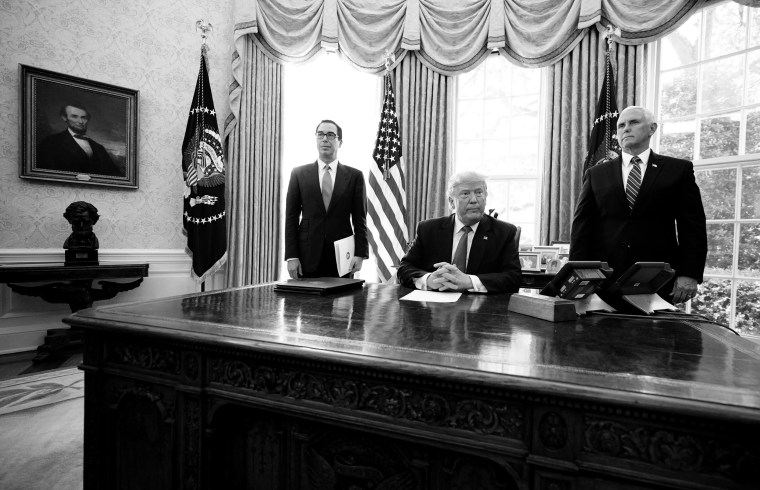The recent escalation with Iran has laid bare the risk of electing a president with no commitment to truth or the ability to think strategically. Reckless decisions such as Trump’s unilateral withdrawal from the Iran nuclear deal have isolated the United States from its allies, and strengthened the Iranian and American hardliners who want conflict, including those in the Trump administration.
Monday’s White House decision to sanction Iran’s Supreme Leader, Ayatollah Ali Khamenei, and other high-ranking Iranian officials reveals the emptiness of Trump’s approach. Sanctions are a means to an end, but not an end in and of themselves. In the absence of a clear foreign policy objective, sanctions are solely punitive measures with no clear aim other than further escalation.
In addition to sanctioning Iranian Revolutionary Guard Corps leaders allegedly responsible for recent Iranian provocations, Treasury Secretary Steven Mnuchin also announced that Iranian Foreign Minister Javad Zarif would be sanctioned by the U.S. later this week, which will make it nearly impossible to negotiate with Iran — though Trump said on Friday that he was prepared to do so with no conditions.
Negotiations require a partner; sanctioning Iran’s top diplomat and then hoping for negotiations is laughable at best. (The Iranians have already said they represent a "permanent closure" of diplomacy between the U.S. and Iran, after Iranian President Hassan Rouhani originally called them "hilarious" and "outrageous and idiotic.") At worst, doing so is intentionally counterproductive and will increase the chances of a military conflict by taking a diplomatic solution off the table for good.
The key to the success of sanctions targeting Iran in the Bush and Obama administrations, unlike the ones announced on Monday, was multilateralism. Between 2006 and 2012, the United Nations passed multiple rounds of sanctions against Iran. These, together with other unilateral and multilateral sanctions, deeply strained the Iranian economy and pressured Iran into the negotiations that resulted in the 2015 nuclear agreement. If the U.S. imposes unilateral sanctions but the Iranians continue to do business with Europe, China and Russia, we cannot hope it will have a measurable impact other than further ratcheting up tension.
There is, of course, no evidence that the Trump administration has, or is aiming to receive, international support for these latest sanctions. They come instead at a time when the U.S. is increasingly isolated and discredited on the world stage, and Iran is taking advantage of our relative weakness to pursue its own agenda and expand its regional influence. The aftermath of the recent attacks in the Strait of Hormuz revealed the Trump administration lacks the credibility to convincingly call out Iran for its regional belligerence.
In the days after attacks on two commercial tankers in the Gulf of Oman, none of our allies fully accepted U.S. claims that Iran was responsible for the attacks and the U.N. secretary general called for an “independent investigation.” In the days after Iran shot down a U.S. drone, our allies silently considered which narrative was more credible: The Trump administration’s claim that the drone was flying over international waters or Iran’s claim that the drone violated its territorial sovereignty.
Trump’s pattern of lying and deception has damaged our credibility to the point where some of our allies are now more likely to believe Iran. In addition, he appears wholly unprepared, unwilling and unequipped to meet current foreign policy challenges, especially those as complex as Iran. This has resulted in a president pulled in various directions by a divided White House, where hawks such as National Security adviser John Bolton are pushing for military action even as others suggest caution.
Ten minutes before launching an airstrike against Iran last week, Trump allegedly called off the operation after learning of the projected number of Iranian casualties. Decisions of this magnitude require a deliberative process and strategy, and military operations should not be ordered — or called off — on a whim. While the details remain murky, this incident revealed that the White House national security decision-making process is deeply divided and flawed.
It wasn't like this always. In previous administrations, the United States executed a clear strategy of sanctioning Iran as a means of increasing pressure, which culminated in a diplomatic solution as opposed to military conflict. These sanctions were a means to an end — the Iran nuclear agreement — which took the imminent threat of a nuclear-armed Iran off the table. Trump’s decision to walk away from the deal in 2018 has left the U.S. isolated and Iran emboldened.
Since that time, Trump’s policy has been replete with hypocrisy and contradiction. The Trump administration has simultaneously vilified the nuclear deal and paid lip-service to reaching a similar agreement. It claimed Iran violated the deal, yet also warned Iran against noncompliance. Now, the president is increasing sanctions and threatening “obliteration” if Iran does not negotiate an end to its nuclear program, while undermining prospects for negotiations.
Despite Iranian compliance with the nuclear agreement — which currently remains in force with five other countries — Iran remains the world’s leading state sponsor of terror and has destabilizing proxy forces across the Middle East. Instead of finding a way to rein in Iran, Trump has vacillated to the point of incoherence, including announcing via a tweet in December that the U.S. would withdraw all troops from Syria. This would have granted Iranian forces unimpeded access across the region, from Tehran to the Mediterranean, had it not been subsequently reversed by the Trump administration as a tacit admission of the president’s recklessness.
At this moment, Trump’s foreign policy toward Iran has been exposed for what it is — meandering and dangerous. There is no defining ideology other than a betrayal of historic alliances and abandonment of international agreements. America is strongest when its policies are guided by principles and values, and Trump has weakened our national security by implementing an erratic foreign policy defined by contradiction, especially as it relates to Iran.



